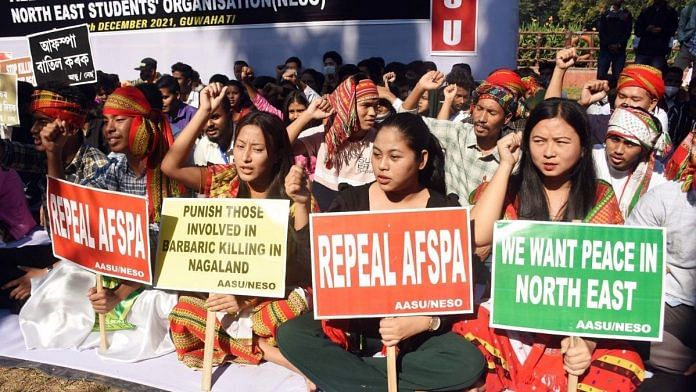Guwahati: The Nagaland government had opposed the extension of the Armed Forces Special Powers Act (AFSPA) in the state prior to and after the 4 December Oting incident, in which an Army ambush led to the deaths of 14 civilians, ThePrint had learnt.
According to an official with the state’s home department, the Nagaland government was consulted on the extension of the AFSPA a month ahead of its expiration in the state on 30 December, as is protocol.
“The state government has been opposing extension for a long time. Since it was to expire… the state government has been putting in their opposition with this. This time too we had opposed the extension on 29 November and then again after the Oting incident,” the official said.
On Thursday, the Narendra Modi government extended AFSPA in Nagaland for another six months even as a committee — formed after the incident — to look into the withdrawal of the Act in the state is yet to submit its report.
“The central government is of the opinion that the area comprising the whole of the state of Nagaland is in such a disturbed and dangerous condition that the use of armed forces in aid of the civil power is necessary,” the Ministry of Home Affairs said in a notification.
The move came weeks after 13 people, most of them from Oting in Nagaland’s Mon district, were killed in a “botched-up” security forces ambush as well as the ensuing violence on 4 December. Looking to intercept militants, the security forces opened fire on a vehicle carrying miners on their way home from coal mines.
A day later, on 5 December, another civilian was shot in the district headquarters after a mob allegedly attacked an Assam Rifles camp. One soldier was killed too, taking the total toll of the incident to 15.
According to a senior home ministry official, the extension was “procedural” since it was lapsing at the end of the month and is “not reflective of anything that lies in future”.
“It was lapsing and the extension was done as part of procedure since we could not have a situation of vacuum till nothing is decided by the committee,” the officer said.
Also read: 2021: As Nagaland mourns Mon killings, aspiration for normalcy stays a distant dream
‘Extension will not affect future decision on AFSPA’
Since the 4 December incident, protests and demonstrations have been held by various civil society groups calling for the repeal of the AFSPA.
The Armed Forces Special Powers Act, 1958, gives special powers to the armed forces in certain “disturbed areas”. These powers include firing upon persons for the maintenance of public order, arresting persons without warrants, and entering and searching premises without warrants, among others.
Following the Oting incident, Nagaland Chief Minister Neiphiu Rio had urged the Centre to revoke the Act in the state.
Then, in a meeting between Union Home Minister Amit Shah, Neiphiu Rio, Assam Chief Minister Himanta Biswa Sarma, Nagaland Deputy Chief Minister Y. Patton, and Naga People’s Front (NPF) Legislative Party leader T.R. Zeliang, it was decided that a committee will be set up that will look into AFSPA’s withdrawal.
The panel comprises the Union home ministry’s additional secretary for the northeast, and the chief secretary and director general of police of Nagaland, among others.
Asked if the new AFSPA extension will affect the committee’s stand on the matter, the senior home ministry official said: “The committee has been set up and it also has representatives from the state government. It has three months to make a decision. The recommendations made by the committee will be looked into.”
He added: “Extending AFSPA now is not reflective of anything that lies in the future. If it is decided mutually that it has to be revoked, then it will be.”
The state home department official quoted above concurred, saying that the extension and the committee appear to be “separate”.
Political parties upset about extension
Meanwhile, the political class in Nagaland has taken issue with the AFSPA extension.
“This extension is a manifestation of the utter disregard the central government has for the voices of small states, particularly in northeast India, considering that the Nagaland Legislative Assembly convened a special one-day session on 20 December to deliberate on AFSPA and the House unanimously resolved to demand its repeal,” the NPF, which is part of the government, said in a statement Thursday.
Several legislators in the state also reportedly felt that the Act should have been kept on hold till the committee had submitted its report.
This report has been updated to revise the last subhead from “Opposition upset” to “political parties upset”. There is no Opposition in Nagaland.
(Edited by Amit Upadhyaya)



